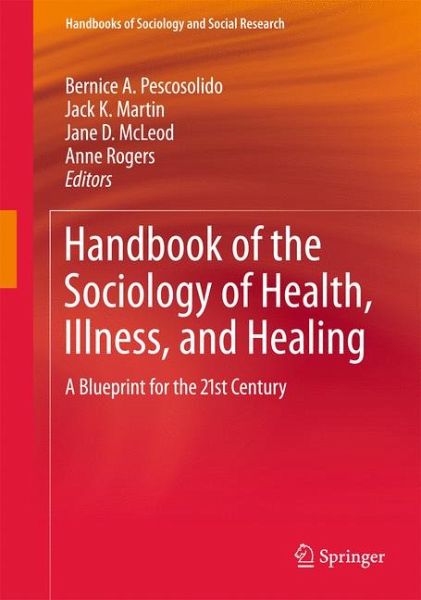
Handbook of the Sociology of Health, Illness, and Healing (eBook, PDF)
A Blueprint for the 21st Century
Redaktion: Pescosolido, Bernice A.; Rogers, Anne; McLeod, Jane D.; Martin, Jack K.
Versandkostenfrei!
Sofort per Download lieferbar
96,95 €
inkl. MwSt.
Weitere Ausgaben:

PAYBACK Punkte
48 °P sammeln!
The Handbook of the Sociology of Health, Illness & Healing advances the understanding of medical sociology by identifying the most important contemporary challenges to the field and suggesting directions for future inquiry. The editors provide a blueprint for guiding research and teaching agendas for the first quarter of the 21st century.In a series of essays, this volume offers a systematic view of the critical questions that face our understanding of the role of social forces in health, illness and healing. It also provides an overall theoretical framework and asks medical sociologists to co...
The Handbook of the Sociology of Health, Illness & Healing advances the understanding of medical sociology by identifying the most important contemporary challenges to the field and suggesting directions for future inquiry. The editors provide a blueprint for guiding research and teaching agendas for the first quarter of the 21st century.
In a series of essays, this volume offers a systematic view of the critical questions that face our understanding of the role of social forces in health, illness and healing. It also provides an overall theoretical framework and asks medical sociologists to consider the implications of taking on new directions and approaches. Such issues may include the importance of multiple levels of influences, the utility of dynamic, life course approaches, the role of culture, the impact of social networks, the importance of fundamental causes approaches, and the influences of state structures and policy making.
In a series of essays, this volume offers a systematic view of the critical questions that face our understanding of the role of social forces in health, illness and healing. It also provides an overall theoretical framework and asks medical sociologists to consider the implications of taking on new directions and approaches. Such issues may include the importance of multiple levels of influences, the utility of dynamic, life course approaches, the role of culture, the impact of social networks, the importance of fundamental causes approaches, and the influences of state structures and policy making.
Dieser Download kann aus rechtlichen Gründen nur mit Rechnungsadresse in A, B, BG, CY, CZ, D, DK, EW, E, FIN, F, GR, HR, H, IRL, I, LT, L, LR, M, NL, PL, P, R, S, SLO, SK ausgeliefert werden.












